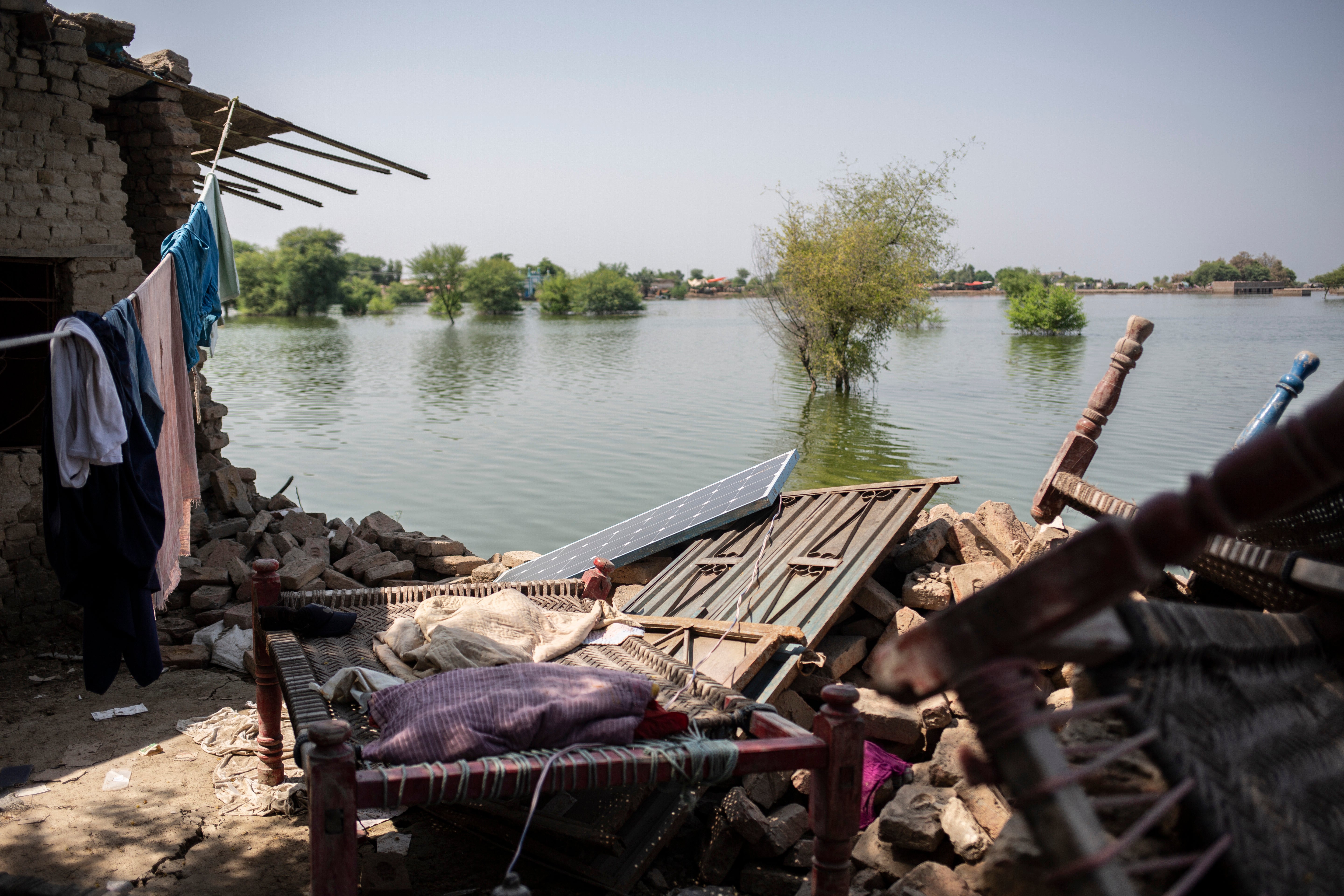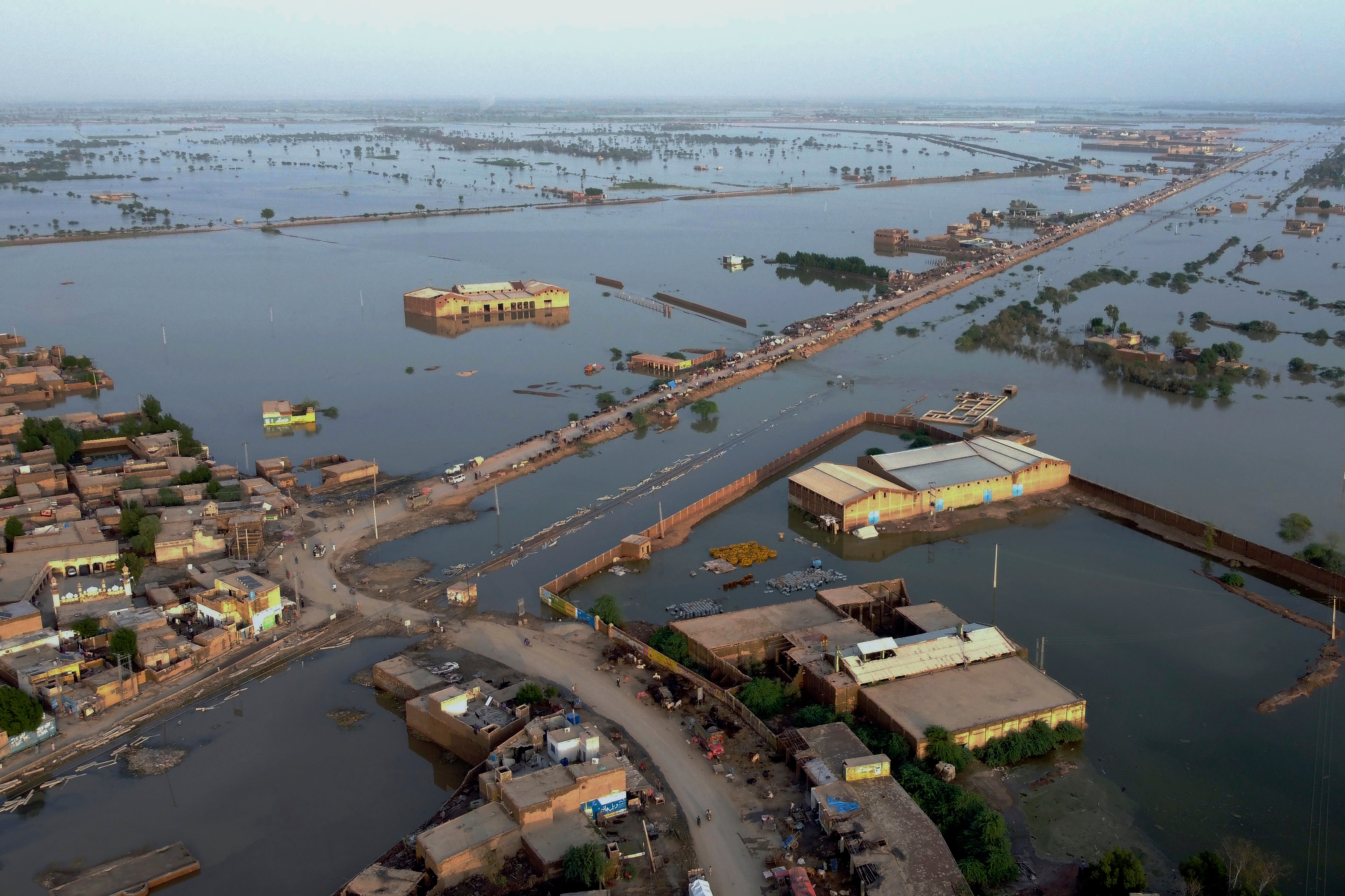Pakistan floods: Millions of women suffering worst health impacts amid unhygienic conditions
As the Cop27 climate summit in Egypt focuses on gendered impacts and water, Pakistan’s flood survivors are still facing the worsening impact on their health
Your support helps us to tell the story
From reproductive rights to climate change to Big Tech, The Independent is on the ground when the story is developing. Whether it's investigating the financials of Elon Musk's pro-Trump PAC or producing our latest documentary, 'The A Word', which shines a light on the American women fighting for reproductive rights, we know how important it is to parse out the facts from the messaging.
At such a critical moment in US history, we need reporters on the ground. Your donation allows us to keep sending journalists to speak to both sides of the story.
The Independent is trusted by Americans across the entire political spectrum. And unlike many other quality news outlets, we choose not to lock Americans out of our reporting and analysis with paywalls. We believe quality journalism should be available to everyone, paid for by those who can afford it.
Your support makes all the difference.Millions of women in Pakistan are still struggling with disease and worsening health as large parts of the country remain underwater or severely damaged by devastating floods.
Women and young girls who survived the August flooding are suffering from urinary tract infections (UTIs), reproductive issues and other health complications, activists from Water Aid Pakistan told the Cop27 summit as negotiations in Egypt turned to the gendered impacts of the climate crisis.
Three months on, stagnant water, unhygienic conditions, poor sanitation and a lack of access to medical facilities continue to impact women’s health.
One woman with an underlying health condition who couldn’t access health facilities due to widespread damage from the floods was advised by doctors to have her uterus removed. Another woman said she feared for the life of her unborn child, the aid agency highlighted in its report chronicling the challenges of the victims.
“The doctor advised me to remove my uterus because it is infecting other parts of my body too. We have lost everything in the floods, and we cannot afford any such surgery,” Rasheeda, 45, a resident of Dadu district of Pakistan’s Sindh province, said.
The activists are calling for leaders and ministers assembled at Sharm el-Sheikh for the two-week climate summit to channel finance towards water, sanitation and hygiene projects in vulnerable countries such as Pakistan so that women and girls – who are bearing the brunt of climate change – can better cope with its impacts.
The development organisation said it visited communities in the Badin and Dadu districts of Sindh province and found women and girls experiencing trauma and anxiety, with some fearful of menstruating due to a lack of privacy and sufficient access to clean menstrual products.
Some were having to resort to tearing their dupatta (scarves) and other clothing to use as pads for their periods.
Tahmina, a nurse working with women and girls from camps in Dadu, told WaterAid that most of the women she meets complain of abdominal cramps, excessive bleeding and unusual discharge.
She has seen symptoms associated with UTIs “significantly increase” and estimates that 70 per cent of women she meets are suffering from the condition.
“Unhygienic conditions, using the same cloth for longer periods, holding urine for longer periods, using contaminated water for drinking and washing purposes, and lack of handwashing are contributing a lot to this. Due to trauma and anxiety, women are in shock.
“Moreover, miscarriages were at a peak during the initial days of the floods. I got to know one case of a stillbirth. I was told that the woman couldn’t get timely medical assistance during her labour pains and the child died before birth.”
Another victim, Rubina, was six months pregnant when she was forced to flee her home in the village of Bachal Laghari, Johi, in Dadu.

Three months on, the 32-year-old now lives with her husband and four daughters in a makeshift camp in the Flood Protection Bund in Johi city and fears for the health of her baby and children.
“I am aware that the stagnant water will take more than three months to be absorbed by the soil, so I just get goosebumps when I think of living here for the next four months. My family has lost everything, but we do not want to lose this baby.”
Rubina is one of the estimated 650,000 pregnant women in flood-affected areas of Pakistan who are in need of maternal health services to ensure safe pregnancy and childbirth. An estimated 8.2 million women living in the flood zone are thought to be of reproductive age.
Finance for vulnerable countries has been one of the top focus points at this year’s climate negotiations as extreme weather events wreak havoc from Pakistan to Africa and Latin America.
The loss and damage fund, a proposed new facility for losses incurred by communities that can’t be rebuilt, has made it to the agenda of the conference after decades of demands.

Aid agencies are urging to bring focus on the disaster victims as government negotiators discuss the details of what the fund will look like.
The impact of climate catastrophes and extreme weather events such as floods and heatwaves has also been found to be disproportionately affecting women and girls. Activists and health professionals raised the alarm that in places such as south Asia, where women tend to spend more time at home and have limited access to medical facilities, gender-focused response mechanisms should be in place.
“The UN secretary-general, António Guterres, declared at Cop that ‘we’re on a highway to climate hell’. Well, women and girls in Pakistan are living that hell right now,” Raheema Panhwar, WaterAid’s provincial coordinator in Sindh, said.
“I challenge world leaders to listen to the words of these women and girls in Pakistan who are on the climate change front line and do all they can to help them and the millions more like them across the globe.
“If they fail to act, many more lives will be hanging in the balance. Clean water, sanitation and hygiene promotion are essential for women and girls to stay disease free, go to school, earn a living and be more self-reliant. They cannot wait any longer for world leaders to act – the time is now.”
This story was published with the support of Climate Tracker’s Cop27 Climate Justice Journalism Fellowship




Join our commenting forum
Join thought-provoking conversations, follow other Independent readers and see their replies
Comments